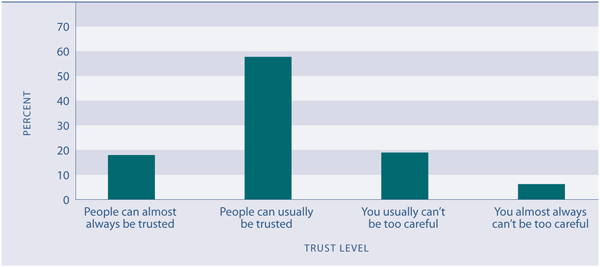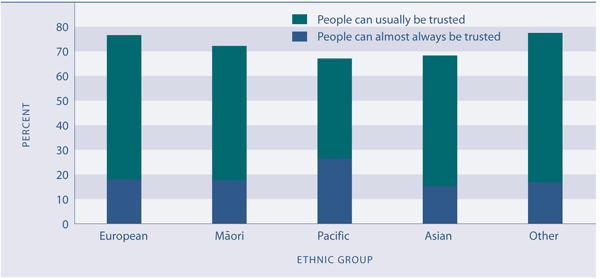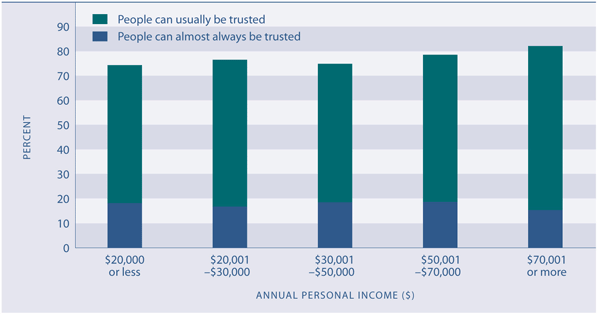Trust in others
Definition
The proportion of the population aged 15 years and over reporting people can "almost always" or "usually" be trusted, as reported in the Quality of Life Survey 2006.
Relevance
Trust in others is an important indicator of how people feel about members of their community. High levels of trust facilitate co-operative behaviour among people and contribute to people's ability to develop positive relationships with others.
Current level
In 2006, 76 percent of New Zealanders said they believed people can be trusted, with 18 percent reporting people can almost always be trusted and 58 percent reporting people can usually be trusted.
Figure SC3.1 Levels of trust in other people, 2006

Source: Quality of Life Survey 2006
Age and sex differences
The proportion of those reporting people can be trusted was similar for males (75 percent) and females (76 percent). Nineteen percent of males and 17 percent of females agreed people can almost always be trusted and 56 percent of males and 59 percent of females responded people can usually be trusted.
Those reporting that people can almost always or usually be trusted ranged from 72 percent at ages 15–24 years to 78 percent for 50–64 year olds.
Ethnic differences
People in the European and Other (excluding Asian) ethnic groups reported a slightly higher level of trust in people (each 77 percent) than Māori (72 percent). Asian and Pacific peoples had the lowest proportions who felt people could be trusted (68 percent and 67 percent, respectively).
Figure SC3.2 Proportion of people reporting that people can almost always or usually be trusted, by ethnic group, 2006

Source: Quality of Life Survey 2006
Socio-economic differences
Across all income levels, a majority of New Zealanders indicated people could almost always or usually be trusted. Reported trust increased with personal income level. People with incomes over $70,000 reported the highest overall level of trust (82 percent), while people with incomes of $20,000 or less reported the lowest level (74 percent).
Figure SC3.3 Proportion of people reporting that people can almost always or usually be trusted, by personal income, 2006

Source: Quality of Life Survey 2006
Regional differences
Across all New Zealand’s largest cities, a majority of New Zealanders indicated people could almost always or usually be trusted. Reported levels of trust were highest in Wellington and Dunedin (both 84 percent) and lowest in Waitakere (66 percent) and Manukau (68 percent).
International comparison
New Zealanders’ level of trust in other people in 2004 compares well with those of people in European Union countries in 2005, and to that of people in Canada in 2003. New Zealand had the seventh highest reported level of trust in other people (almost always trust or usually trust) out of 25 OECD countries.104
New Zealand’s reported level of trust in other people (69 percent) is above the OECD median of 56 percent. Norway had the highest reported level of trust in people (87 percent) followed by Denmark and Sweden (both 84 percent). Canada (53 percent) and the United Kingdom (55 percent) reported lower levels of trust in other people than New Zealand. |



